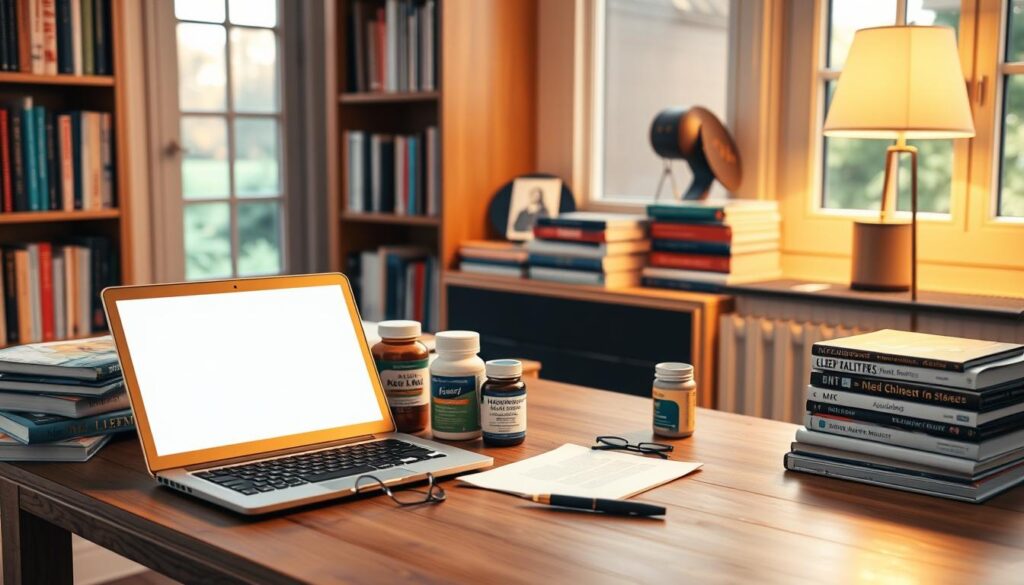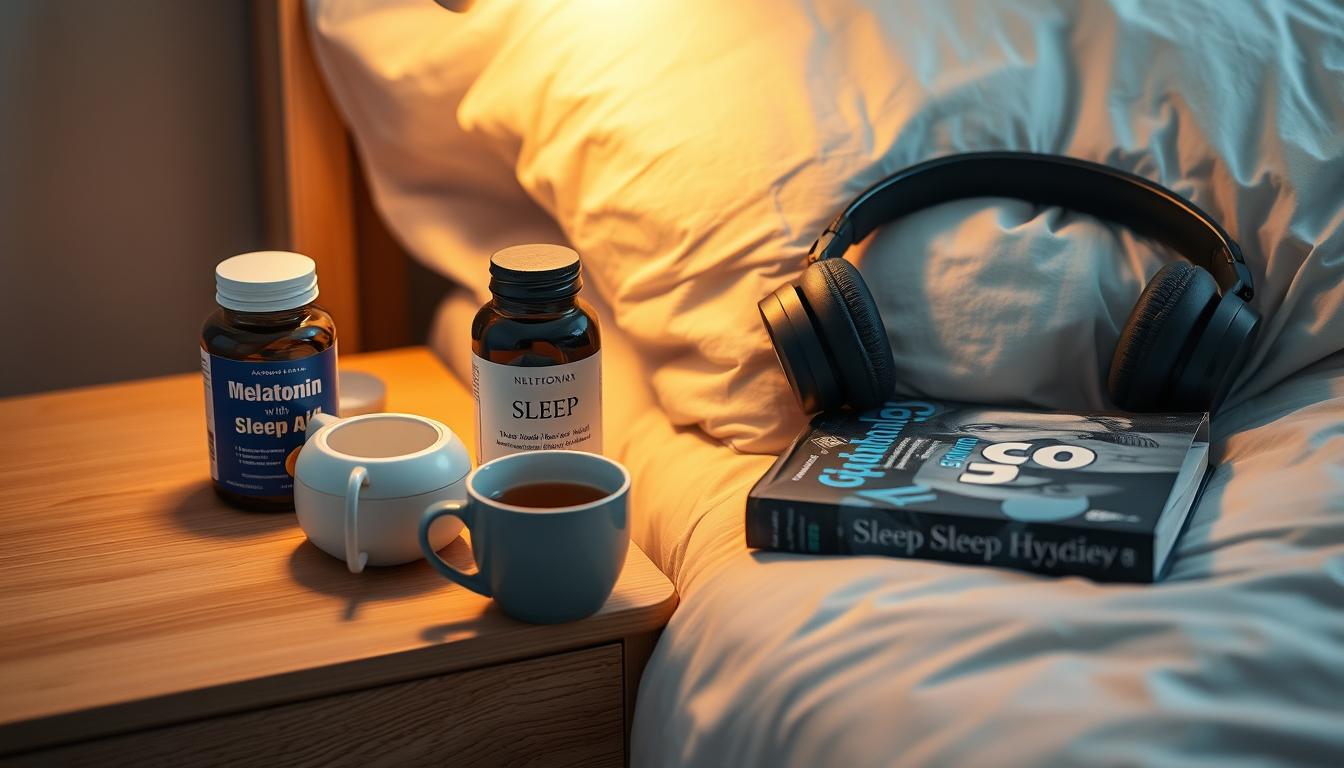Helping your teen get quality sleep is key to their well-being, but finding the best sleep aids for teenagers can feel overwhelming. Teens face unique challenges like homework, screens, and changing sleep cycles. This guide helps parents navigate options to support healthier rest. Every choice impacts their focus, mood, and daily life.
Key Takeaways
- Poor sleep affects grades, mental health, and energy levels in teens.
- Explore both OTC and natural options when selecting sleep aids for teenagers.
- Consult a pediatrician before trying new products.
- Consistency in routines and environment improves sleep quality.
- Look for products with transparent ingredients and safety ratings.
Understanding Teen Sleep Challenges
Teens face unique barriers to restful sleep. Hormonal changes, school demands, and tech use disrupt their natural sleep cycles. Learning about these challenges is key to improving teenage sleep.
Common Causes of Sleep Issues
- Delayed circadian rhythm shifts, making falling asleep hard.
- Social media and phone use emit blue light that delays melatonin release.
- Academic pressures and late-night homework routines.
Impacts on Health and Performance
Chronic sleep loss can lead to:
- Weakened immune systems and higher illness rates.
- Difficulty concentrating in school, lowering grades.
- Mood swings and increased anxiety or depression risks.
Addressing these factors early helps teens regain energy and focus. Small changes like reducing screen time before bed or setting consistent sleep schedules make a big difference. Prioritizing sleep hygiene builds a foundation for better overall well-being.
Analyzing OTC Sleep Aids for Teenagers
Over-the-counter sleep aids are widely available, but selecting the right option for teens demands careful research. Many products contain antihistamines or herbal blends marketed for sleep support. Always prioritize safety and consult a healthcare provider first.
| Product Type | Active Ingredient | Primary Use | Pros | Cons |
|---|---|---|---|---|
| Benadryl | Diphenhydramine | Allergy relief, occasional sleep aid | Quick drowsiness | Risk of daytime fatigue |
| Unisom | Doxylamine | Short-term sleep support | Longer duration of action | May cause morning grogginess |
Check labels for age restrictions and dosage instructions. Avoid products combining caffeine or stimulants. Side effects like dizziness or dry mouth are common.
“Teens’ developing brains require extra caution with OTC products,” advises the American Academy of Pediatrics. “Always start with lifestyle adjustments first.”
Look for products with minimal additives. Compare ingredients and duration of effects. Never mix with other medications without medical advice. Prioritize formulations designed for younger users.
Exploring Natural Sleep Remedies
Natural sleep remedies offer gentle alternatives to help teens relax and improve sleep quality. These approaches focus on balancing body and mind without medications. Parents can explore herbal options and daily habits that support better rest.
Herbal Options to Consider
Herbs like chamomile, valerian root, and lavender are popular choices. Chamomile tea, for example, contains compounds that may calm the nervous system. Valerian root supplements, when used under adult supervision, can also promote relaxation. Aromatherapy with lavender essential oils is another safe option. Always check product labels for purity and age recommendations.
Lifestyle Changes for Better Sleep
- Reduce screen time: Blue light from phones and tablets disrupts sleep hormones.
- Set a routine: Consistent bedtimes and wake times strengthen sleep cycles.
- Increase daylight exposure: Morning sunlight helps regulate the body’s internal clock.
“Small lifestyle shifts can have big impacts on sleep,” says Dr. Lisa Matsoukas, a pediatric sleep specialist. “Encouraging teens to unwind with reading or gentle yoga can also ease transitions into bedtime.”
Combining these strategies creates a supportive environment for better rest. Natural sleep remedies work best when paired with patience and consistency. Consult a healthcare provider before trying new supplements to ensure safety.
The Role of Melatonin for Teenagers
Melatonin supplements can help teenagers reset their natural sleep rhythms. When used properly, melatonin for teenagers may improve sleep quality by aligning their internal clocks with daily routines. It’s important to explore how this hormone can support their health without disrupting natural sleep patterns.
Here’s what parents and teens should know about using melatonin safely and effectively:
Benefits of Melatonin
- Helps realign sleep cycles affected by late-night screens or early school hours
- May shorten time to fall asleep and boost sleep duration
- Non- habit forming when used as directed
Potential Side Effects
Rare but possible effects include morning drowsiness or mild headaches. Overuse might interfere with the body’s natural melatonin production. Seek a doctor if symptoms persist.
Recommended Dosage
Most teens start with 0.5–1 mg taken 30 minutes before bed. Never exceed 1 mg without medical advice. Always consult a healthcare provider to determine the right amount for your teen’s needs.
Reviewing Sleep Supplements for Teens
Choosing the right sleep supplements for teens requires careful attention to what’s inside the bottle. Parents and caregivers should prioritize products designed specifically for younger users, avoiding generic options meant for adults. Start by checking labels for ingredients proven to support rest without harmful side effects.
Ingredients to Look For
Look for supplements with calming components like melatonin, magnesium, or herbal extracts such as chamomile or valerian root. Avoid additives like caffeine or artificial flavors that might disrupt sleep. Always verify if the product includes a pediatrician’s recommendation or clinical trial data.
How to Read Labels
- Check the dosage instructions for age-specific guidance.
- Verify if the brand provides third-party lab test results to confirm purity.
- Avoid supplements listing vague terms like “proprietary blends” instead of clear ingredient lists.
Labels should also highlight potential interactions with medications. Teens taking ADHD or anxiety meds may need to consult a doctor before use. Opt for brands with USP Verified or NSF Certification to ensure quality.
“Supplements should never replace good sleep hygiene, but when needed, prioritize formulas with transparent ingredients and safe dosing,” says Dr. Emily Carter, a pediatric sleep specialist.
Evaluating Safety Profiles of Sleep Aids
When choosing sleep aids for teens, safety must come first. Always check labels for ingredients linked to side effects like drowsiness or stomach upset. OTC options like antihistamines (e.g., diphenhydramine) may cause daytime fatigue, while herbal remedies like valerian root require caution for potential interactions.

- Review ingredient lists for allergens or known risks.
- Ask your pediatrician about interactions with existing medications.
- Look for products with third-party lab testing (e.g., USP verified).
- Choose brands transparent about sourcing, like Nature’s Bounty or Now Foods.
Always prioritize FDA-approved supplements and avoid products with stimulants like caffeine.
“Teens taking sleep aids should start with the lowest effective dose and monitor reactions,” advises the National Sleep Foundation.
Opt for melatonin supplements with 0.5–1 mg doses, as higher amounts may disrupt natural rhythms. Avoid OTC sleep aids combining multiple active ingredients unless a doctor approves. Safety profiles matter most—never rush decisions. Talk to a healthcare provider first.
Comparing OTC vs. Natural Sleep Aids
Choosing between over-the-counter (OTC) and natural sleep aids involves weighing benefits and risks. Teens and parents often face a dilemma: quick relief versus long-term wellness. Let’s break down the differences clearly.
Pros and Cons of OTC Options
- Pros: Fast-acting formulas like diphenhydramine (found in brands like Benadryl) can provide immediate sleepiness.
- Cons: Side effects like daytime drowsiness or dependency risks may affect school performance.
Advantages of Natural Remedies
- Pros: Herbs like valerian root or chamomile tea reduce side effects and support overall health.
- Cons: Effects may take longer to notice, requiring consistent use.
“Natural options align with long-term health goals but require patience,” says Dr. Sarah Lee, a pediatric sleep specialist. “OTC aids can be a short-term fix if used cautiously.”
Parents should assess urgency versus sustainability. Combining both approaches with sleep hygiene tips—like avoiding screens before bed—often yields the best results.
Guidelines for Selecting the Right Sleep Aid
Picking the right sleep aid for your teen requires careful consideration. Start by assessing their unique sleep patterns and daily routine. Teens with irregular schedules or stress from school or social pressures may need different approaches.
- Consult a healthcare provider first. A doctor can rule out underlying issues like anxiety or sleep disorders.
- Match the aid to their needs. If they struggle with anxiety, herbal options like chamomile may help. For circadian rhythm issues, melatonin could be an option.
- Check ingredient lists. Avoid products with additives like caffeine or high sugar. Look for FDA-approved ingredients or third-party tested brands like Nature’s Aid or California Gold Nutrition.
- Start with small doses. Even natural remedies can cause side effects. Track reactions and adjust as needed.
- Pair aids with sleep hygiene. No supplement works alone. Combine with consistent bedtime routines and screen-free wind-down periods.
Always read reviews from reputable sources like the National Sleep Foundation or peer-reviewed studies. If symptoms persist, seek professional guidance instead of self-medicating. Prioritize long-term habits over quick fixes for sustainable rest.
Understanding Sleep Hygiene Tips for Teens
Teens thrive when they practice good sleep hygiene—simple habits that prepare their bodies for rest. Small changes can make a big difference in energy levels and mood. Let’s explore easy steps to build better sleep patterns.
Establishing a Consistent Bedtime Routine
A regular schedule trains the body to relax at the right time. Try these steps:
- Go to bed and wake up at the same time every day—even on weekends.
- Wind down with calming activities like reading or listening to soft music.
- Avoid screens 1 hour before bed to reduce blue light exposure.
Creating a Sleep-friendly Environment
A bedroom setup matters. Follow these guidelines:
- Keep the room cool, dark, and quiet. Use blackout curtains if needed.
- Invest in a comfortable mattress and pillows.
- Remove distractions like phones or video games from the bedroom.
“A consistent routine helps teens fall asleep faster and stay asleep longer,” says Dr. Lisa Medalie, a sleep specialist.
Small adjustments to routines and surroundings can boost sleep quality. Prioritizing sleep hygiene tips for teens now sets the stage for lifelong healthy habits.
Improving Teenage Sleep: Holistic Approaches
Healthy sleep for teens isn’t just about pills or supplements—it’s about balancing lifestyle choices. Holistic approaches focus on habits that boost overall well-being, making better sleep a natural outcome.
- Exercise daily: Physical activity like soccer or swimming reduces stress and improves sleep cycles. Aim for 30-60 minutes most days.
- Watch what they eat: Avoid caffeine after noon and heavy meals before bed. Foods rich in magnesium, like almonds or spinach, support relaxation.
- Mindfulness practices: Guided breathing or 10-minute meditation sessions can calm an overactive mind. Apps like Calm or Headspace offer tailored programs for teens.
- Limit screens before bed: Blue light from phones delays melatonin release. Encourage reading or drawing instead of scrolling.
“Consistent habits create the strongest foundation for healthy sleep,” says Dr. Emily Carter, a sleep specialist at Stanford Children’s Health. “Small daily changes add up over time.”
Combining these strategies creates a support system that works with the body’s natural rhythms. For example, pairing yoga with a bedtime snack of yogurt and bananas (rich in sleep-friendly nutrients) strengthens this approach. Every choice reinforces better rest without relying solely on supplements.
Start with one change, like turning off devices an hour earlier, and build from there. Over weeks, these steps help teens feel more energized and focused during the day.
Addressing Teenager Insomnia Solutions
Insomnia can disrupt a teen’s life, but effective teenager insomnia solutions exist. Combining practical steps and support helps many regain restful nights. Start with these proven strategies.
Behavioral Strategies
- Set a fixed sleep schedule: Go to bed and wake up at the same time daily—even on weekends.
- Limit screens before bed: Blue light from phones or tablets delays sleep hormones. Try reading or listening to calming music instead.
- Daylight exposure: Morning sunlight helps reset the body’s internal clock naturally.
When to Seek Professional Help
Consult a doctor if insomnia persists for weeks or causes:
- Extreme daytime sleepiness affecting schoolwork or mood.
- Severe anxiety or depression linked to sleep loss.
- Unusual behaviors like sleepwalking or breathing issues at night.
Early intervention can prevent long-term struggles. Talk to a healthcare provider to explore options like therapy or medical evaluations.
Integrating Expert Advice and User Reviews
Choosing a sleep aid for teens requires balancing expert advice and real-world experiences. Medical professionals highlight safety and science-backed options, while user reviews reveal how products work in everyday life.
Effective sleep choices arise where clinical guidance and lived experiences meet.
Experts stress the importance of consulting doctors before trying sleep aids like melatonin. User reviews often mirror these points, with teens noting improved sleep after following recommended dosages. For example, many parents report success with herbal blends that align with pediatrician suggestions.

Look for reviews mentioning consistency with medical guidelines. Check if users describe results matching what studies suggest—like reduced anxiety or better rest cycles. Avoid products praised for quick fixes but lacking expert endorsement.
- Compare user feedback with safety data from health organizations.
- Choose products with transparent ingredients listed by both brands and reviewers.
- Look for sleep aids rated highly by both teens and healthcare providers.
Always cross-reference user experiences with sleep aids for teens recommended by trusted sources. This blend helps families avoid unsafe options and find solutions that work for their unique situation.
Best Sleep Aids for Teenagers: A Comprehensive Overview
Choosing the right sleep aid for teens requires balancing safety, effectiveness, and personal needs. Here’s a clear breakdown of top options based on research and real-world use.
Comparison of Top Products
- Melatonin 1 mg (Natrol): A popular OTC choice for regulating sleep cycles. Works best with consistent bedtime routines.
- Valerian Root Extract (Nature’s Way): Natural herb to promote relaxation. No known dependency risks.
- Calms Forte (Now Foods): Combines chamomile and lemon balm for stress relief. Non-drowsy formula.
User Experiences
“My son uses melatonin nightly and stays asleep better. No side effects so far.” – Parent review on Amazon
Many teens find herbal blends like Yogi Bedtime Tea helpful for winding down. Others prefer tech tools like white noise apps for calming environments.
Always pair sleep aids with good sleep hygiene: limit screens before bed and keep rooms dark. Consult a doctor before starting new supplements.
Conclusion
Selecting the right sleep aid for teenagers requires careful consideration of safety and effectiveness. Natural sleep remedies like chamomile tea or melatonin, when used correctly, can support better rest. Always check product labels for ingredients like valerian root or magnesium and follow recommended dosages. Prioritizing sleep hygiene—such as consistent bedtimes and limiting screens before bed—also plays a key role. If sleep issues persist, consulting a doctor ensures personalized guidance. Teens thrive when their routines and choices align with their health needs. Balancing the right products with healthy habits creates a strong foundation for lasting well-being.
FAQ
What are the best sleep aids for teenagers?
The best sleep aids for teenagers typically include options like melatonin, herbal supplements, and certain over-the-counter (OTC) remedies. It’s essential to consider natural sleep remedies and consult a healthcare professional to find the right solution for your teen’s unique needs.
How does melatonin work for teenagers?
Melatonin is a hormone that helps regulate sleep-wake cycles. For teenagers, melatonin supplements can support improved sleep quality and help adjust their biological clocks, especially if they’re experiencing sleep challenges due to lifestyle changes or late-night activities.
Are there any natural sleep remedies that are effective for teens?
Yes, natural sleep remedies such as valerian root, chamomile tea, and lavender can be effective for promoting relaxation and improving sleep quality. Implementing lifestyle changes like reducing screen time before bed and practicing good sleep hygiene can also be beneficial.
What are some sleep hygiene tips for teens?
Sleep hygiene tips include establishing a consistent bedtime routine, creating a comfortable sleep environment, and limiting caffeine intake, especially in the afternoon and evening. Encouraging a technology-free winding down period before bed is also crucial for better sleep.
When should I consider sleep supplements for my teenager?
You should consider sleep supplements for your teenager if they struggle with insomnia, have irregular sleep patterns, or show signs of fatigue. Always consult a healthcare provider before starting any supplements to ensure they are appropriate and safe.
What are some common causes of teenage insomnia?
Common causes of teenage insomnia include stress from school or social life, irregular sleep schedules, excessive use of electronic devices, and stimulants like caffeine or nicotine. Understanding these factors can help address sleep issues more effectively.
How can I tell if melatonin is safe for my teenager?
It’s crucial to speak with a healthcare professional about the safety of melatonin for your teenager. Generally, when taken in recommended dosages, melatonin is considered safe, but potential side effects and interactions with other medications should be evaluated.
What behavioral strategies can help improve teenage sleep?
Behavioral strategies include practicing relaxation techniques, maintaining a consistent sleep schedule, and engaging in physical activities during the day. These methods can significantly enhance sleep quality and help combat insomnia.
When should I seek professional help for my teenager’s sleep issues?
If your teenager experiences persistent sleep disturbances, exhibits excessive daytime sleepiness, or struggles with insomnia for an extended period, it may be time to consult a healthcare professional. They can provide tailored advice and explore any underlying health conditions.
How can I create a sleep-friendly environment for my teenager?
To create a sleep-friendly environment, make sure the bedroom is dark, cool, and quiet. Encourage the use of comfortable bedding and limit distractions from electronics. Creating a calming atmosphere with relaxing scents or sounds can also enhance sleep quality.
